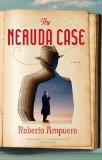Summary | Excerpt | Reviews | Beyond the Book | Readalikes | Genres & Themes | Author Bio

A Novel
by Roberto AmpueroExcerpt
The Neruda Case
What could be bothering the partners of Almagro, Ruggiero & Associates, who had asked him to appear at their headquarters in such a hurry? Cayetano Brulé wondered one warm February morning as he left his office in the attic of the Turri Building, in the heart of Valparaíso's financial district, and took the elevator down to Prat Street. Ever since democracy was restored, AR&A had become the most inf luential consulting firm in the country, and it was rumored that no stipulation or public litigation of any importance could pass without its sanction. Its tentacles spanned from the presidential palace to the neo-Gothic headquarters of businessmen, and from Congress to the National Comptroller's Office, passing through ministries, political parties, embassies, and courts. Its attorneys could not only obtain laws and decrees, subsidies and pardons, exemptions, and amnesties, but also wash away disgrace and polish the prestige of public figures down on their luck. AR&A operated in corridors and behind the scenes, and though its top executives attended key receptions and dinners in the capital, its proprietors were essentially invisible, and rarely attended social gatherings or granted interviews to the press. But when they did decide to appear on the great stage of the nation's political and business affairs, they glowed in their Italian suits and silk ties, with their triumphant smiles and cosmopolitan manners, as they cryptically offered opinions on various matters, like the Oracle at Delphi. When Cayetano lifted his gaze along the buildings on Prat Street, the Turri clock marked eleven forty-five as its bells pealed mournfully and seagulls soared and cawed under the crystalline sky. He thought of The Birds, the Alfred Hitchcock movie he'd seen in a Sunday matinee at the Mauri Theater, before diving into the everyday din, whistling, keeping a steady pace.
At Plaza Aníbal Pinto, a rumbling in his gut made him stop at the Café del Poeta. It wouldn't matter if he spent a few minutes there. The big bosses at AR&A wouldn't be upset if he was late; on the contrary, in their nervous state they'd imagine other clients were in need of his services, he thought, as the aroma of roasted coffee slid through his Pancho Villa-style mustache. Many things delighted him about this place, aside from the coffee with a dash of milk and of course the sandwiches: the old polished floorboards, the display of porcelain English tea sets in the window, the oil paintings with port motifs, and the cozy light of the bronze lamps. He preferred the table by the entrance, from which he could contemplate the hundred-year-old palms in the plaza and the statue of Neptune seated amid the rocks and the multicolored fish of a fountain, as well as the cemetery at the top of Cárcel Hill, a capricious graveyard that, in every earthquake, spewed an avalanche of mausoleum bricks, wooden crosses, and ramshackle coffins full of cadavers down into the center of the city. From that table, he could also watch the imported trolleys, secondhand from Zurich, as they circulated from place to place with their original German signage, as if they were still running past the plain façades of silent Helvetian neighborhoods, and had never disembarked to find the potholes, stray dogs, papers, and street vendors of Valparaíso.
In any case, the illustrious Almagro and Ruggiero would have to be patient, Cayetano Brulé concluded as he adjusted the knot of his tie, which was bright purple with little green guanacos, and waited for the waitress, a pale goth girl with jet-black hair and black clothing who wore a Kanye West-style headset to communicate with the kitchen. He unfolded the local newspaper and read on the front page about the defeat of the long-suffering soccer team the Wanderers, the slashed throat of a model in the gardens of the Viña del Mar casino, and the alarming rise of unemployment in the region. This last piece of information didn't surprise him. The decline of Valparaíso was no secret. In the nineteenth century, it had been the most important and prosperous port on the Pacific; Enrico Caruso and Sarah Bernhardt acted in its theaters, Gath & Chaves and exclusive European boutiques opened along its streets, and a quarter of its population, being foreign, spoke no Spanish. But a ferocious earthquake on the night of August 16, 1906, devastated the city and buried more than three thousand of its inhabitants under the rubble of buildings, houses, and mansions, all in a matter of seconds. That same night, thousands of people abandoned the city for good, and those who remained, began, from that moment on, to live by evoking the splendor and glitter of the past, the beauty of the disappeared city, convinced that in some not-too-distant future a miracle would restore the march of progress. But just one day short of eight years later, that same progress dealt them another brutal blow: the opening of the Panama Canal, which was celebrated on August 15, 1914, and strangled Valparaíso. The bay became desolate overnight; the warehouses in the port went empty; the cranes stood still on the wharf; and the bars, shops, and restaurants closed their doors forever; casting employees, whores, and pimps into permanent unemployment.
Excerpted from The Neruda Case by Roberto Ampuero. Copyright © 2012 by Roberto Ampuero. Excerpted by permission of Riverhead Books. All rights reserved. No part of this excerpt may be reproduced or reprinted without permission in writing from the publisher.




Censorship, like charity, should begin at home: but unlike charity, it should end there.
Click Here to find out who said this, as well as discovering other famous literary quotes!
Your guide toexceptional books
BookBrowse seeks out and recommends the best in contemporary fiction and nonfiction—books that not only engage and entertain but also deepen our understanding of ourselves and the world around us.